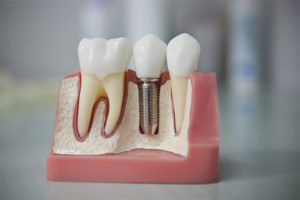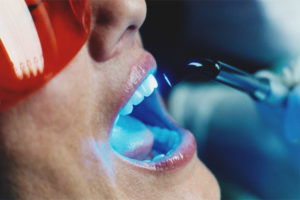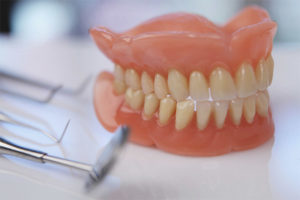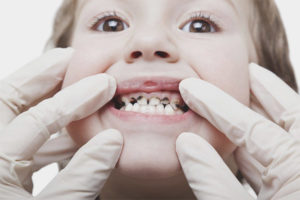The content of the article
Despite the fact that we still eat to live, and not vice versa, food and the process of its adoption are incredibly important for every person. We don’t put anything horrible in our mouths, we choose fresh and tasty products whenever possible, we make out the dishes beautifully, time the family holidays for dinner. All this is so important for a person, so even slight discomfort in the process of eating becomes a real problem. Tooth sensitivity occurs when various aggressive compounds touch the surface of the tooth. This may include acidic and sweet foods, too cold and hot drinks, the patient feels especially pronounced pain when brushing his teeth. Even a simple inhalation of air through the mouth can lead to sharp and piercing toothache. In this article, we will try to understand why teeth become sensitive and how to deal with it - independently and in the dentist's office.
Why tooth sensitivity increases
Despite the fact that the tooth is a solid bone structure, it is a living organism. Most of the tooth is dentin, inside of which, like arteries, nerve connections flow. The tooth surface is covered with the hardest part of the human body - enamel. Despite the fact that the enamel is really very hard, it can be destroyed. Because of this, the dentinal tubules are exposed, any touch brings serious discomfort. So, what can cause excessive tooth sensitivity?
- Caries. Everyone is accustomed to the fact that caries are black painful points that occur in the structure of the tooth. However, the first step in tooth decay with caries is damage to the tooth enamel. Carefully inspect the tooth - if there are whitish patches on its surface, then the tooth began to decay due to caries, this is the first stage of the lesion. If measures are not taken in time, the damage will turn into black hollows. If the cause of hypersensitivity is caries, the tooth will especially hurt after a sweet tooth.
- Mechanical chips. Very often, tooth enamel can be chipped from injury or contusion. A blow to the maxillofacial zone, using teeth to crack nuts, bruxism, frequent consumption of seeds and crackers - all this can lead to similar injuries. If the tooth sensitivity sharply increased after a dental intervention, this may indicate poor-quality or insufficient treatment. Enamel is usually cut off for prosthetics, however, with proper treatment, the patient will not feel pain.
- Abrasive cleaning. Enamel can lose its protective function in many cases, most often this is due to the illiterate and dangerous use of abrasive substances. We often trust dubious advice and begin to whiten our teeth with activated charcoal, baking soda, etc. All this leads to the abrasion of enamel, scratches appear on the surface, in which pathogens accumulate and serve as an additional source of infection. Do not use abrasive cleaners! Only specialized toothpastes are acceptable, and then, not often, and after consulting a doctor. If the enamel is thin and sensitive, you can’t even use hard brushes to brush your teeth!
- Chemical exposure. Despite the fact that the enamel is very hard, a person finds opportunities to destroy even this fabric. Frequent consumption of alkalis and acids leads to chemical damage to the tooth surface.These include fruit juices, carbonated drinks, coffee, alcohol, sweets.
- Lack of vitamins. Tooth enamel mainly consists of calcium, phosphorus and fluorine. If these substances are not enough in the body, the protective surface of the tooth is not able to perform its functions, the enamel is quickly destroyed and exposes the dentinal tubules.
- Periodontal disease, periodontitis. Some gum disease can expose the cervical part of the tooth. The enamel in these areas of the tooth is very thin, therefore more sensitive to any kind of impact.
- Cold after hot. Well, to whom in childhood parents did not say that you can’t eat ice cream after hot tea and vice versa. But we, unfortunately, do not always adhere to this rule, and sudden temperature changes often lead to the destruction of tooth enamel.
- Tartar. If the tooth surface is covered with tartar, enamel and dentin do not receive the necessary amount of vitamins from the outside, they are not cleaned of bacteria properly. Pathogens with insufficient hygiene corrode the enamel structure, make it more loose and prone to destruction.
- Nicotine. Tobacco smoke contains a huge amount of toxins and poisons. With regular and long-term exposure, the tooth surface is destroyed.
These are external causes that increase tooth sensitivity. In addition, the cause of the destruction of tooth enamel can be various internal changes in the body - pregnancy, hormonal changes, various systemic diseases. If the sensitivity is negligible, it is quite possible to cope with it at home.
Folk remedies to reduce tooth sensitivity
Some home recipes are really able to cope with the problem. Rinses allow you to get rid of pathogenic bacteria that destroy enamel, lotions and compresses restore the healthy structure of the protective surface of the tooth.
- Chamomile. Chamomile decoction allows you to soothe the gums, cope with inflamed areas and disinfect the surface of tooth enamel. Add a little eucalyptus or lemon balm to the camomile - the peppermint composition will help block the nerve endings and quickly relieve pain.
- Oak bark. The composition of this component contains many tannins, which literally seal open dentinal tubules and relieve pain. A strong decoction of the bark in a warm form must be kept in the oral cavity for at least five minutes.
- Coffee beans. With severe attacks of toothache after cold and hot, you just need to chew coffee grains. This will relieve not only discomfort, but also from bad breath.
- Eggplant peel. This ingredient contains special substances that can restore tooth enamel. The peel can be used as a rinse - to prepare a decoction from it. But a greater effect can be achieved if the skin is dried and the powder is rubbed into the affected parts of the tooth, left for 10 minutes, and then rinsed in the mouth with water.
- St. John's wort, sage, calamus root, coltsfoot. Prepare a decoction from these plants, rinse their mouth every two hours, this will help get rid of discomfort.
- Tea tree oil. This oil has an excellent disinfecting effect, add a couple of drops to a glass of warm water and rinse your mouth with this composition after each meal. With a local lesion, you can drip oil on a small piece of cotton wool and attach to the painful area of the tooth. It is also effective in relieving caries pain.
- Infusion of burdock root. This healing root contains many useful substances that can disinfect the surface of the tooth and freeze the nerve for a while so that it does not react to acidic and sweet foods. The root should be chopped, poured with alcohol, left for three weeks.A spoon of cooked alcohol tincture should be added to a glass of water and rinsed with this composition the oral cavity 5-6 times a day.
But remember, folk remedies are effective only with slight discomfort, give a temporary effect, but they can stop the process of destruction of enamel. In the fight against increased tooth sensitivity, a set of measures should be used.
How to reduce tooth sensitivity
First of all, you should carefully observe oral hygiene - brush your teeth twice a day, disinfect your mouth with rinses, use dental floss and toothpicks after eating. You need to protect your teeth - after any mechanical injury, contact your dentist to solve the problem. It is important to visit a doctor twice a year so that he recognizes caries at an early stage. Remember, the sooner treatment begins, the cheaper, faster and more effective it will be. It is important to abandon sour, sweet, hot and cold foods, drinks. It is important to exclude fruit juices from the diet, especially citrus fruits. Refuse for a while from strong coffee or drink it through a straw. This will not only protect you from discomfort, but will also strengthen tooth enamel. Never use abrasive powders, lemon juice or other acids to brush your teeth. It is better to purchase gentle toothpastes - they cover the dentinal tubules and, with constant use, help reduce tooth sensitivity. Among the most effective are Lacolut Extra Sensitive and Sensodyne.
Try to monitor the diet - it should be enriched with vitamins and minerals. Include protein foods that have a lot of calcium in your diet. You can cook calcined cottage cheese at home. In a liter of fatty natural milk, you should add a couple of tablespoons of kefir and the contents of an ampoule of sodium chloride, which is also called a "hot" injection. Put the container on a small fire, the milk will begin to curdle. When the curd mass is completely separated from the whey, it should be reclined on cheesecloth. As a result, you get cottage cheese - incredibly delicious and rich in calcium. Eat it regularly and tooth problems will bypass you.
After each meal you need to rinse your mouth with warm water, use a soft brush to clean the enamel. It is important to give up smoking and not to alternate cold and hot drinks, dishes. Timely treat dental diseases and regularly go for preventative cleaning, which will get rid of tartar.
Professional solution to the problem
If the sensitivity of the teeth is so high that it affects the quality of life, then the issue should be taken more seriously. Similar problems are solved in the dentist's office. What can a doctor offer in this situation?
- Treatment of concomitant pathologies. First of all, the doctor will treat concomitant diseases, which often become a source of increased tooth sensitivity. This includes the removal of tartar, treatment of pulpitis, caries, periodontitis, periodontal disease, etc. And only after that the dentist will offer various means for restoring tooth enamel.
- Remineralization. This is the restoration of the protective layer of the tooth with special medicines, which include calcium and fluoride. First, the teeth are cleaned with hydrogen peroxide, then with a cotton swab, a calcined composition is applied. After drying, a fluorine preparation is applied with the next layer. This is repeated several times, sensitivity decreases after the first visit to the dentist.
- Fluoride. Fluoride is a modern tool that restores the protective layer of enamel, with sufficient dexterity, the fluorination procedure can be done independently at home. The teeth are thoroughly cleaned, dried, and fluoride is applied to the affected teeth with a brush.You need to sit with your mouth open for at least 5 minutes until the fluoride varnish dries. Beware of getting the composition on the gums, this can lead to a burn of the mucous membrane. Repeat the procedure three times with an interval of two days. After applying fluoride, you can’t brush your teeth and eat solid food for another day. A correctly performed procedure will protect you from discomfort for about six months.
- Iontophoresis. The procedure consists in compaction and thickening of tooth enamel. Using low-frequency currents, calcined compounds are introduced into the structure of damaged enamel, which restore the enamel and saturate it with minerals.
- Laser. If the problem is local in nature and the discomfort is concentrated in one place, the doctor usually offers laser therapy. This is a modern, safe and effective way to get rid of high tooth sensitivity. Naked dentinal tubules are simply treated with a laser, the nerve is sealed and stops responding to external stimuli.
Depending on the individual characteristics of the patient, the doctor may suggest other ways to restore the enamel - applying a protective film, using medical pastes in a mouthpiece, etc.
Teeth - this is a resource that must be carefully preserved, because the second dentition will not grow, and prosthetics costs considerable expenses, efforts and worries. Take care of your teeth, observe hygiene rules, do not bite nuts and do not open beer bottles with your teeth. Try to eat ice cream with a spoon, do not drink it with hot coffee. Visit your dentist regularly. Follow these recommendations and this will help you protect yourself from hypersensitivity.
Video: how to strengthen tooth enamel and reduce sensitivity












Submit